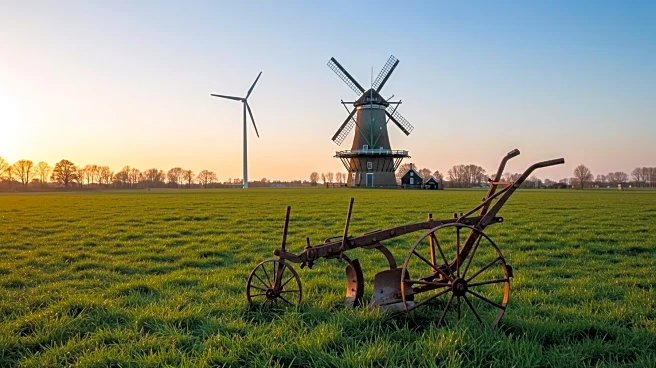What's Happening?
Farmonaut has released insights into the importance of heritage agriculture as a backbone for sustainable farming practices by 2025. The report emphasizes the preservation of traditional farming methods, such as crop rotation and organic fertilization, which are crucial for maintaining soil health and biodiversity. Heritage agriculture involves the use of vintage tractors and traditional farming techniques that have been adapted over centuries to local environmental conditions. These practices are being integrated with modern technologies like AI and satellite monitoring to enhance efficiency and sustainability. The report highlights that over 60% of sustainable farms in 2025 are expected to incorporate elements of traditional tractor methods, showcasing the synergy between historical wisdom and contemporary technological advancements.
Why It's Important?
The integration of heritage agriculture with modern technology is significant for addressing current agricultural sustainability challenges. By preserving traditional methods, farmers can reduce chemical inputs, protect soil health, and maintain productivity, which are essential in combating climate change effects. Heritage agriculture supports biodiversity by preserving indigenous crop varieties and livestock breeds, enhancing resilience against pests and diseases. Economically, heritage foods command premium prices in niche markets, providing farmers with new revenue streams. The cultural aspect of heritage farming reinforces rural identity and community pride, fostering social cohesion and economic revitalization in rural areas.
What's Next?
As the agricultural sector moves towards 2025, the focus will be on further integrating heritage practices with advanced technologies. Farmonaut plans to continue supporting farmers with satellite-monitored insights and AI-powered advisories to optimize heritage crop rotation and maximize yield sustainability. The adoption of blockchain traceability will ensure transparency in the supply chain, enhancing consumer trust in heritage products. Regulatory bodies and NGOs are expected to support these initiatives through documentation, funding, and policy advocacy, ensuring that heritage agriculture remains a vital component of sustainable farming.
Beyond the Headlines
The revival of heritage agriculture practices not only addresses environmental sustainability but also has ethical and cultural implications. By valuing traditional knowledge and practices, society acknowledges the contributions of past generations to modern agriculture. This approach fosters a deeper connection between consumers and the origins of their food, promoting ethical consumption and appreciation for cultural diversity. Long-term, the integration of heritage agriculture with modern technology could lead to a paradigm shift in how food systems are structured, prioritizing resilience, diversity, and sustainability.








